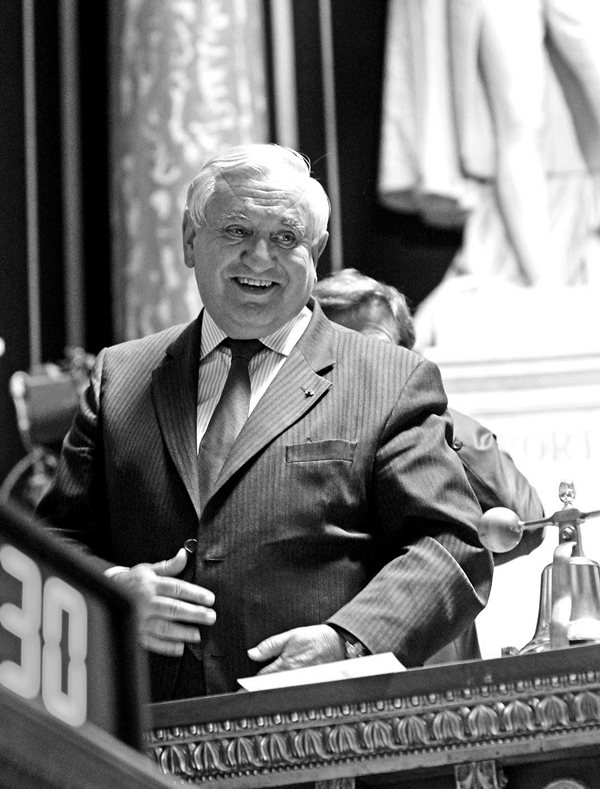France acknowledges a new pecking order
Updated: 2016-02-06 00:45
By Chris Peterson(China Daily)
|
|||||||||
 |
|
Jean-Pierre Raffarin,former French prime minister |
China has resumed its place in the international front row and its economic power means it is vital for France to consolidate its relationship with Beijing, according to a report from a French government body headed by former prime minister Jean-Pierre Raffarin.
“Beijing’s dynamics can no longer be viewed as local or regional,’’ says the report by the French Foreign Affairs, Defense and Armed Forces Commission. “China has retaken its place at the front row of nations. Its presence is obvious. Chinese power is worldwide, it’s global.”
The 100-page report says China’s international partners must adapt to the new situation, which has been in effect a reorientation of power, which includes making the economy more China-facing, coupled with a fresh look toward international aspects.
China has moved to the forefront its Belt and Road Initiative, part of which involves serious investment in overseas infrastructure. As a result, Beijing is behind the creation of various financial bodies such as the Asian Infrastructure Investment Bank and the New Development Bank, formerly called the BRICS Development Bank.
The internationalization of the Chinese currency, the renminbi, is closely attached to the country’s new economic strategy, the report concludes. The report was written before the International Monetary Fund announced the renminbi would join the US dollar, British pound, Japanese yen and euro in its basket of reserve currencies.
The report calls for a tight dialogue between France and China, saying the two countries “can develop mutual benefits for more qualitative and more inclusive growth’’.
The report says` that in the past, French and other Western economies had suffered because the Chinese economic model had been based on large volumes of low-cost exports. The current reshaping of the Chinese economy, with its emphasis both on quality products as well as a focus on domestic consumption and service industries, offers “undeniable opportunities” for France.
“Obviously this transition could result in lesser growth for China, but the consequences will be in the volume of trade. France must look beyond the notion of competition if it wants to take part in a partnership logic that is demanding but strong,’’ the commission says.
China, because of its size physically and demographically, does not fit into any normal category and therefore cannot be considered a competitor in the usual sense of the word, it says.
The senators identified three areas in which France and China could participate in what officials have called a “win-win” situation: a growing Chinese demand for quality food products, coupled with a shift in diet and improved food security; better healthcare, including a reorganized system; and better communication, given new technology now available.
According to Raffarin, “the principle of economic development resides in innovation, and not in low costs. For the Chinese, freedom means a freedom to create, to research, to develop new products. They have a strong belief in science and progress.’’
It urges a global bilateral partnership using a variety of tools, such as a better entry visa system, exchanges of expertise such as through the French Development Agency, a greater acceptance of Chinese investment in France, and joint actions in other parts of the world, such as Africa.
Raffarin says China is well aware that its old economic model was running out of steam.
“This change, demanded by public opinion and the workers, is accompanied by measures to fight corruption and to modernize the Party,’’ Raffarin said.
Henri de Raincourt, a member of the commission, wrote in his remarks: “We are all aware of the formidable economic growth this country has known in the past 40 years, but I am thinking we are collectively underestimating this phenomenon.
“The Chinese economy is from now on a key element of the world economy, into which she (China) is fully integrated.’’
China, the report concludes, intends to play what it calls “the traditional international game’’, which had hitherto been the prerogative of powers such as the United States.
“China is willing to project itself to the exterior world, in particular it wants to create multilateral tools which will not be dominated by the United States; it wants to develop joint actions in third-party nations, for example with France, whether these are in Latin America or in Africa,’’ it says.
The commission consisted of Raffarin, de Raincourt, Helene Conway-Mouret, Andre Trillard and Bernard Cazeau, all members of the French Senate.
chris@mail.chinadailyuk.com
- General strike against pension reform brings Greece to standstill
- Madrid airport sounds alarm after bomb threat on Saudi plane
- Obama proposes new oil tax to fund clean transportation
- UN special envoy announces temporary pause of intra-Syrian talks
- Taliban kill 10-year-old hailed as militia hero
- Obama slams anti-Muslim rhetoric during first visit to US mosque

 Kindness walls bringing extra warmth to the needy
Kindness walls bringing extra warmth to the needy
 A robot that grabs red envelopes
A robot that grabs red envelopes
 Culture Insider: 9 things you may not know about Start of Spring
Culture Insider: 9 things you may not know about Start of Spring
 Talented artist makes tiny pencil lead sculptures
Talented artist makes tiny pencil lead sculptures
 Ten most heartwarming stories about Spring Festival Rush
Ten most heartwarming stories about Spring Festival Rush
 China's 'Moon Walker' sends back stunning HD photos
China's 'Moon Walker' sends back stunning HD photos
 Starbucks, office rents and CEOs form alternative outlook on China
Starbucks, office rents and CEOs form alternative outlook on China
 China's most beautiful wetlands
China's most beautiful wetlands
Most Viewed
Editor's Picks

|

|

|

|

|

|
Today's Top News
National Art Museum showing 400 puppets in new exhibition
Finest Chinese porcelains expected to fetch over $28 million
Monkey portraits by Chinese ink painting masters
Beijing's movie fans in for new experience
Obama to deliver final State of the Union speech
Shooting rampage at US social services agency leaves 14 dead
Chinese bargain hunters are changing the retail game
Chinese president arrives in Turkey for G20 summit
US Weekly

|

|








